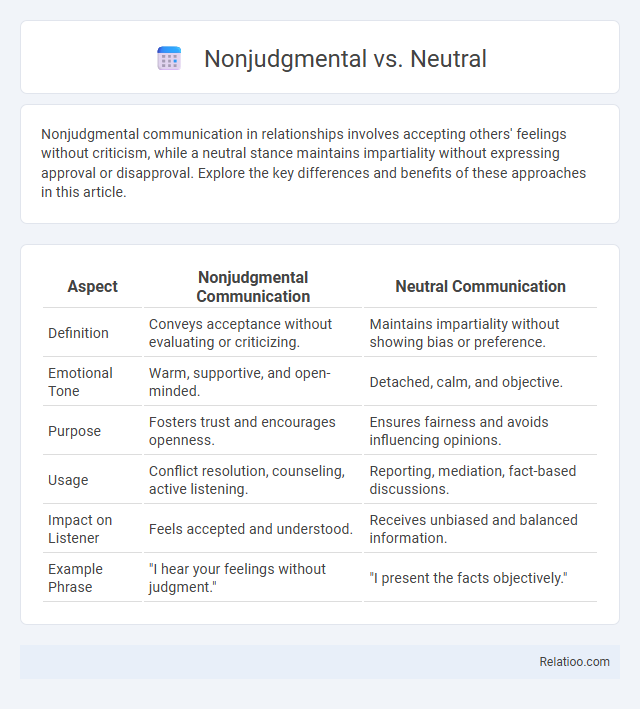Nonjudgmental communication in relationships involves accepting others' feelings without criticism, while a neutral stance maintains impartiality without expressing approval or disapproval. Explore the key differences and benefits of these approaches in this article.
Table of Comparison
| Aspect | Nonjudgmental Communication | Neutral Communication |
|---|---|---|
| Definition | Conveys acceptance without evaluating or criticizing. | Maintains impartiality without showing bias or preference. |
| Emotional Tone | Warm, supportive, and open-minded. | Detached, calm, and objective. |
| Purpose | Fosters trust and encourages openness. | Ensures fairness and avoids influencing opinions. |
| Usage | Conflict resolution, counseling, active listening. | Reporting, mediation, fact-based discussions. |
| Impact on Listener | Feels accepted and understood. | Receives unbiased and balanced information. |
| Example Phrase | "I hear your feelings without judgment." | "I present the facts objectively." |
Understanding Nonjudgmental and Neutral: Key Definitions
Nonjudgmental refers to an attitude of accepting and acknowledging others' feelings or behaviors without assigning value or criticism, emphasizing empathy and open-mindedness. Neutral describes a stance of impartiality and lack of bias, where no preference or judgment is expressed, often in contexts requiring objective observation or mediation. Understanding these key definitions clarifies that nonjudgmental involves emotional acceptance, while neutral implies detachment from judgment or bias.
The Core Differences Between Nonjudgmental and Neutral Approaches
Nonjudgmental approaches involve recognizing and accepting your experiences or others' without assigning value or criticism, fostering empathy and understanding. Neutral approaches focus on maintaining an impartial stance that neither favors nor opposes any side, emphasizing objectivity and detachment. Your ability to distinguish nonjudgmental acceptance from neutral impartiality enhances conflict resolution and interpersonal communication by balancing empathy with fairness.
Situational Examples: When to Be Nonjudgmental vs Neutral
In conflict resolution, being nonjudgmental means withholding personal opinions to create a safe space for open dialogue, whereas being neutral involves remaining impartial without taking sides or expressing preferences. For example, a therapist remains nonjudgmental by listening empathetically to clients without criticism, while a mediator maintains neutrality by facilitating discussions without favoring either party. Choosing nonjudgmental responses fosters trust and understanding in emotional situations, whereas neutrality is essential in legal or organizational contexts to ensure fairness and objectivity.
Psychological Benefits: Choosing Nonjudgmental Over Neutral
Choosing a nonjudgmental approach over a neutral stance enhances psychological well-being by fostering empathy, reducing anxiety, and promoting emotional safety. Your ability to engage without imposing judgment encourages open communication and self-acceptance, crucial for mental health and personal growth. Emphasizing nonjudgmental attitudes supports resilience and strengthens interpersonal connections more effectively than mere neutrality.
Impact on Communication: Which Approach Builds Trust?
Nonjudgmental communication fosters trust by creating a safe space where Your thoughts and feelings are accepted without criticism, encouraging openness and honesty. Neutral communication maintains impartiality, which can prevent bias but may seem distant or disengaged, potentially hindering emotional connection. Nonjudgmental approaches consistently build stronger trust, as they signal empathy and support, essential for meaningful and effective communication.
Professional Settings: Practicing Nonjudgment vs Neutrality
In professional settings, practicing nonjudgmental attitudes involves actively withholding personal biases to create an open, supportive environment, while neutrality requires maintaining an impartial stance without influencing outcomes. Your ability to distinguish between nonjudgmental acceptance and neutral observation enhances communication and conflict resolution effectiveness. Emphasizing nonjudgmental approaches fosters trust and collaboration, whereas neutrality ensures fairness and objectivity in decision-making processes.
Common Misconceptions About Nonjudgmental and Neutral Responses
Common misconceptions about nonjudgmental and neutral responses often confuse the two terms, but they differ significantly in intent and impact. Nonjudgmental responses involve withholding personal judgments and biases to create a safe space for open communication, while neutral responses aim to avoid taking sides or expressing any opinion, which can sometimes feel detached or indifferent. Your ability to distinguish between these approaches enhances empathetic communication, fostering trust and understanding.
Ethical Implications: Navigating Bias and Objectivity
Nonjudgmental approaches emphasize withholding personal biases and moral evaluations, fostering empathy and respect in interactions, which is critical in ethical decision-making. Neutrality requires balancing competing interests without favoring any side, ensuring fairness and objectivity but sometimes risking detachment or passivity. Maintaining a nonjudgmental stance while being neutral supports ethical integrity by promoting unbiased analysis and reducing prejudice in professional and interpersonal contexts.
Skills for Cultivating Nonjudgmental and Neutral Attitudes
Cultivating nonjudgmental and neutral attitudes involves skills such as mindfulness, active listening, and self-awareness to observe experiences without bias or evaluation. Developing emotional regulation and empathy enhances your ability to respond objectively, promoting understanding without personal judgment. Practicing these skills consistently supports emotional intelligence and effective communication in diverse situations.
Deciding Your Approach: Nonjudgmental, Neutral, or Both?
Deciding your approach involves understanding that being nonjudgmental means withholding personal opinions and biases to fully accept others, while being neutral requires no side-taking to maintain impartiality in discussions or conflicts. Selecting nonjudgmental strategies fosters empathy and trust, whereas neutrality promotes fairness and balanced resolution. You can integrate both approaches to create a supportive yet objective environment tailored to your specific interactions and goals.

Infographic: Nonjudgmental vs Neutral
 relatioo.com
relatioo.com